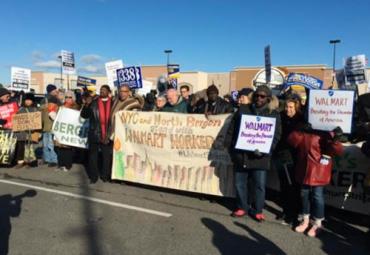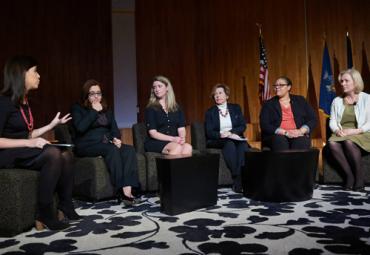Our fight for justice
Our country strives to be a more perfect union—one that believes in freedom, opportunity and justice for all. Every day, our union, the AFT, strives for fairness, democracy, economic opportunity and high-quality public education, healthcare and public services for our students, our families and our communities.
Yet, too many things still stand in the way of American dream: Economic and racial inequality and bias. Sexual discrimination. Wage stagnation. Retirement insecurity. Escalating student debt and child care costs. The greatest wealth gap since the 1920s, and poverty that impacts nearly one-quarter of our children (and half of all kids in public schools).
We must knock down these obstacles if we are going to reclaim the promise of America—the promise that when you work hard and play by the rules, your family can thrive. That you can send your kids to strong neighborhood public schools and give them the chance to be successful in college, career and life without being trapped by debt. That working people are provided with a voice, the freedom to join a union, high-quality healthcare, the ability to take time off to take care of a sick child, and, after a lifetime of hard work, a retirement with dignity. That’s what we all want for ourselves and our families.
[[{"fid":"2399","view_mode":"wysiwyg","fields":{"format":"wysiwyg"},"type":"media","attributes":{"alt":"Ferguson students and Randi Weingarten","style":"width: 250px; height: 202px; float: left; margin: 4px;","class":"content_area_full_width media-element file-wysiwyg"},"link_text":null}]]Fifty years ago, Martin Luther King, Jr. reminded us that the struggle for civil rights is a struggle for good jobs, with decent wages. That educational opportunity is the highway to economic opportunity. This message is just as important today as we fight to ensure everyone can climb the ladder of opportunity.
And that’s why fighting racism, sexual assault, wage stagnation and retirement insecurity is as much the AFT’s work as fighting for high-quality public education, healthcare and public services. We won’t settle for a public education system or economic system that only works for the wealthy few. Or a criminal justice system that offers anything less than justice for all.
It’s our collective responsibility to confront racism— before it robs more people of opportunities. During a trip to Ferguson, Mo., this week, I heard hope and real fear in the voices of the students, teachers and community members with whom I met. Think about the fact that more black men are behind bars today than were enslaved in 1850. And many of us are haunted by this question: If Michael Brown, Eric Garner and Tamir Rice were white, would they be alive today?
Over the past several weeks, thousands have protested and engaged in civil disobedience because of the fear that our criminal justice system is not colorblind. I joined them, and was arrested myself, because sometimes it’s not enough to simply speak out against injustice.
Cops are not the enemy—they are our first responders—bias, racism and economic inequality are. Creating more good jobs can be a springboard for change. We must work together to create a more perfect nation where all people see justice.
Likewise, when scores of young women began coming forward to share how their colleges failed to deal with accusations of rampant sexual assault, our union helped to change policies on campus. And I shared my own story of sexual assault nearly 30 years ago, because if more survivors feel emboldened to speak out, and more understand that they aren’t to blame, we’ll begin to shatter the culture that has allowed this epidemic to take hold.
It’s not enough to say that everyone should be able to go to college; we must pave the way for all students to achieve their dreams—not to be devastated by assault or sidelined by massive debt. Ending sexual assault on campus is going to take sound policies and accountability for institutions. The outpouring of support that has buoyed me since I told my story gives me hope that change is possible.
In the growing movement to counter economic inequality, our union has fought for a living wage. On Black Friday, we stood with Wal-Mart workers who, along with low-wage workers in other industries, have created a powerful national campaign around the call to increase the minimum wage. It has been amazing to watch the collective power build as communities and working people band together to fight for dignity and respect.
That’s the power we need in order to overcome the obstacles that stand in the way of too many dreams, aspirations and opportunities. We as a union are committed to building that power and fighting for the ladder of opportunity for all.
Change takes time. But what sets our nation apart is that, even in our darkest hours, we strive to make things better. During this week’s winter solstice, we celebrate the holiday season with light as a symbol of hope. In this coming new year, it’s my hope that we’ll remove the obstacles of the past to give way to the opportunities of the future.


